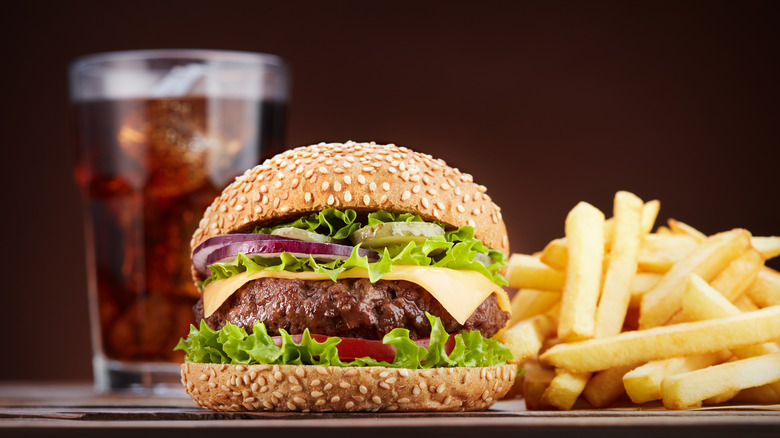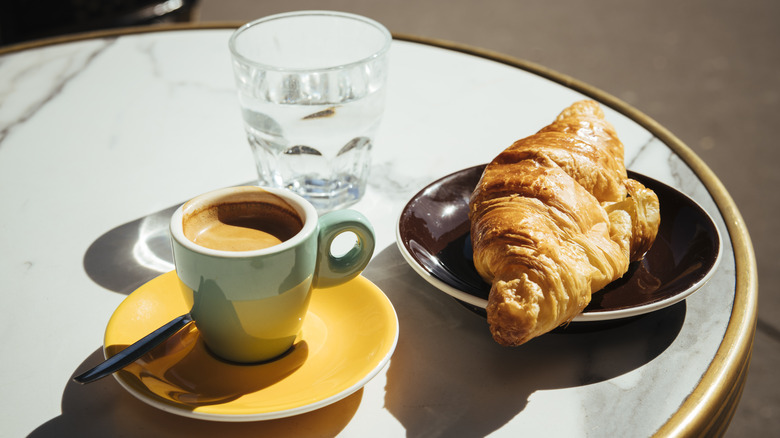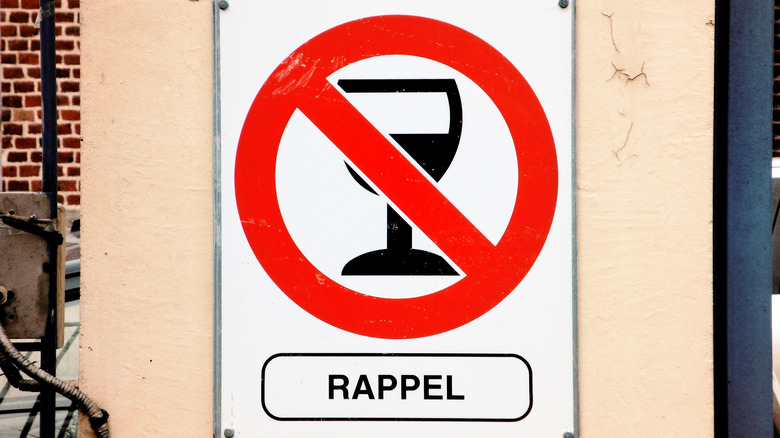Why Olympians Will Be Eating Less McDonald's And Other Fast Food In Paris
What kind of food fuels an elite athlete like sprinter Usain Bolt? Olympians, you might imagine, would survive on a lean protein- and vegetable-based diet, but Bolt allegedly ate 1000+ chicken nuggets while participating in the Beijing Olympics. While he may be the fastest of Olympian fast foodies, he's hardly the only one. At the London Olympics, an estimated 20% of meals sold in the Village came from a pop-up McDonald's that was (briefly) the chain's largest restaurant. That won't be the case this year in Paris, though, since Olympic Village head of food Philipp Würz has said no to fast food and yes to more nutritious meals, per The Guardian.
Food at the 2012 London Olympics wasn't that bad, since in addition to Mickey D's, sushi, steaks, spring rolls, salads, and a host of other foods were available catering to dietary needs from paleo to halal. The Olympic, however, gathers athletes from all over the world and not every country has a McDonald's, so for some participants, the Olympic Village eatery may have been their only chance to experience those world-famous fries. Still, France has been trying to one-up its neighbor for the better part of a millennium and if there's one area this country excels in, that would be cuisine. With the eyes of the world upon Paris and the country's culinary honor at stake, Würz and company have been working to design the perfect Olympic menu.
What Olympians will be eating instead
As France is the home of the Michelin Guide (as well as the tire company whose name it bears), you probably won't say "quelle surprise!" when you find out that several Michelin-starred chefs have been recruited to help design Paris' Olympic Village menu. One spécialité de la maison, created by two-starred chef Amandine Chaignot, couldn't be more French if it tried: a croissant topped with a poached egg, sauced with artichoke cream, and garnished with shaved sheep's cheese and truffles. There will also be fresh-baked baguettes (an estimated 800 per day), along with French pastries, cheeses, and locally-sourced meats.
Plant-based foods, too, will be in abundance, making up roughly a third of the menu. Still, there will be some fast food items on offer such as hot dogs and burgers, although these, too, may be veggie versions like the soy-based nuggets that are set to take the place of chicken ones. Such foods will also be shunted off to the side in designated "grab and go" areas rather than being given pride of place. Les chefs have chosen to honor some special orders, however, arranging for kimchi at the request of the Korean delegation and MIlo malted milk to make the Australian athletes feel at home. They're even supplying the Brits with porridge as a heartier alternative to a croissant and café au lait continental breakfast but may be drawing a line at the full English.
Fast food's not the only thing off the table in the Olympic Village
If you're wondering whether Olympic athletes can sneak out of the village to satisfy a late-night Mickey D's craving, the answer is no, not even Usain can bolt to get his daily dose of McNuggets if the soy ones don't satusfy. Olympians, it seems, are required to stay in the village beginning five days before their event and ending two days after it's done. During that time, they'll eat what's on offer, and drink what's allowed, which means that all 10,000+ athletes will also be staying clean and sober since booze is banned in the village.
Sacre bleu, no Dom Perignon to celebrate a victory? No, not so much as a glass of vin ordinaire to drown the sorrows of defeat. There will, however, be an alcohol-free sports bar so participants can hang out and chat over a mocktail or similar zero-proof libation. Olympians alone won't be the only ones staying dry for the duration, though. Under French law, no booze is to be sold to spectators inside the stadiums except for the bigwigs in VIP suites. Oh well, c'est la vie sans rosé.


